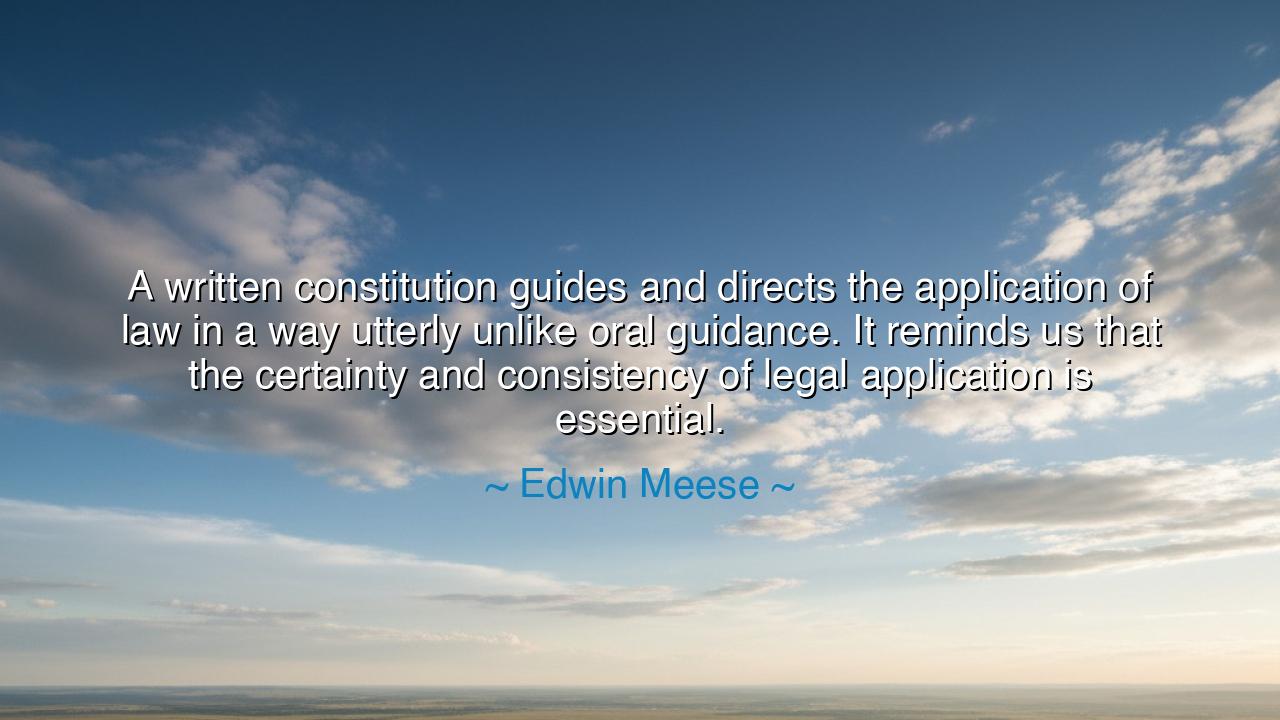
A written constitution guides and directs the application of law
A written constitution guides and directs the application of law in a way utterly unlike oral guidance. It reminds us that the certainty and consistency of legal application is essential.






Hear the solemn voice of Edwin Meese, who declared: “A written constitution guides and directs the application of law in a way utterly unlike oral guidance. It reminds us that the certainty and consistency of legal application is essential.” These words strike like a hammer upon stone, for they call us to remember that justice, if it is to endure, must be anchored in clarity and permanence, not left to the shifting winds of memory or the wavering tongues of men.
The ancients knew this truth well. When Moses descended from Sinai with the commandments graven in stone, it was not mere ceremony—it was the revelation that divine law, once written, could not be altered by the whim of a ruler or forgotten in the passage of years. So too, a written constitution binds the hearts of a people across generations, reminding them of their covenant with justice and shielding them from the decay of arbitrary rule. Unlike oral guidance, which fades with the speaker, the written word stands eternal, a sentinel against forgetfulness.
Think upon the fate of Athens. Its early laws were preserved only in the memories of nobles and judges, who bent them according to their desires. Chaos spread, and the people groaned under oppression. Then came Solon, who inscribed laws upon wooden tablets, placing them where all could see. Though not perfect, this act brought certainty, for no man could claim ignorance, and no magistrate could twist the law without shame. In this we see how a written constitution offers a shield of consistency—protecting both the strong and the weak, the noble and the common.
In contrast, where the law is unwritten, it becomes prey to corruption. In medieval kingdoms, where monarchs proclaimed justice by word alone, subjects never knew whether yesterday’s decree would hold tomorrow. The king’s whim was law, and justice became as unstable as the weather. By contrast, in nations where constitutions were written, liberty grew roots. The American Constitution, though imperfect in its beginning, provided a framework that outlasted centuries of conflict, offering both direction and restraint. Its endurance testifies to the wisdom of binding governance in words that outlive their makers.
But Meese’s words are not only historical—they are a warning. For even a written constitution can be neglected if people forget its meaning or fail to demand its respect. When leaders twist written law through careless interpretation, they are no different than those who relied on oral guidance—arbitrary, shifting, dangerous. Thus, the people must not only treasure the written word, but also guard it, study it, and hold their rulers accountable to it.
The lesson is clear: if you would preserve justice, cling to the written record. Let every citizen learn the words of their founding charters, not as relics, but as living promises. Let parents teach their children that certainty in law is the bedrock of freedom, and that without consistency, liberty becomes fragile. For when the people forget their constitution, they surrender their inheritance to the ambitions of the powerful.
Practically, this means reading and reflecting upon the constitution of your land. Know your rights, so that they may not be taken from you. Know the duties of your rulers, so that they may not escape them. Insist upon transparency in the making of law, and speak when leaders forget that the written word binds them as surely as it binds the governed. For in this vigilance lies the preservation of all that is just.
So let it be remembered: the written constitution is not merely ink upon parchment—it is a covenant, a torch passed down the corridors of time. Guard it, honor it, live by it, and teach it, that the light of certainty and consistency may shine forever, and justice may reign not for a season, but for the ages.






AAdministratorAdministrator
Welcome, honored guests. Please leave a comment, we will respond soon